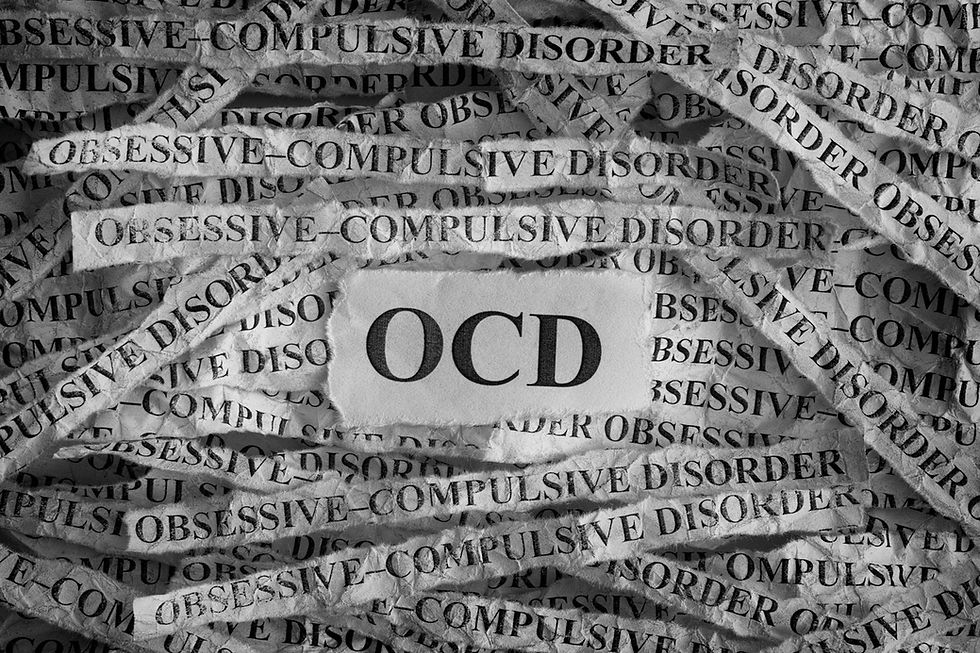Stop Saying “I’m So OCD”: Why Casual Misuse of Mental Health Terms Matters
- Audrey L.

- Aug 16, 2024
- 4 min read

It’s pretty commonplace to hear people say, “I’m so OCD” offhandedly when they describe their love of color-coding their closet, arranging their desk neatly, or keeping their kitchen spotless. The phrase might be used as a lighthearted joke about perfectionism or orderliness, but this casual use of “OCD” as an adjective trivializes a serious mental health condition and contributes to the misunderstanding and stigma that surround it. Obsessive Compulsive Disorder (OCD) is not about liking things tidy; it is a complex, often debilitating disorder that deserves respect, not mischaracterization.
Using “OCD” in a casual manner flattens it into a stereotype, completely misrepresenting what the disorder actually is. Obsessive Compulsive Disorder is not shorthand for being tidy. At its core, OCD is a mental health condition defined by two painful ingredients: intrusive, unwanted thoughts (obsessions) and repetitive behaviors or mental rituals (compulsions) meant to quiet the anxiety those thoughts spark. Yes, for some people, this can involve cleanliness or order, but that’s only one way OCD manifests itself. For others, OCD looks like being tormented by violent or taboo thoughts you’d never act on but can’t stop imagining. It might mean checking the lock 37 times because your brain screams that if you don’t, your family will die. It can mean repeating prayers until they feel “just right,” or avoiding people you love for fear of harming them. This isn’t quirky, it’s consuming, terrifying, and exhausting.
The Harm of Casual Language
Some may argue that saying “I’m so OCD” is just harmless slang. But words shape the way we think, and casual misuse of clinical terms can have real consequences. When OCD is equated with neatness or quirkiness, people who actually have OCD may feel dismissed or misunderstood. It can even make it harder for people to recognize OCD in themselves, or for friends, teachers, and even doctors to take it seriously. For those struggling with intrusive thoughts that are often disturbing, frightening, or shame-inducing, hearing their disorder reduced to “I like my pens lined up” can make them feel even more isolated. That disconnect doesn’t just sting. It reinforces the idea that OCD is just a personality quirk, not a serious illness worthy of treatment and empathy.
The Challenge of Living with OCD
For many people, OCD is not just inconvenient, it is disabling. Compulsions can consume hours each day, interfering with school, work, and relationships. Obsessions can be so distressing that they lead to depression, avoidance behaviors, or suicidal thoughts. Treatment often requires intensive therapy, sometimes combined with medication. Reducing all of that to “I like my socks folded a certain way” isn’t just inaccurate, it erases the very real suffering behind the diagnosis. And the people who suffer from OCD deserve better.
Why Accuracy Matters
Language shapes how society views mental illness, and how society views mental illness shapes everything from funding for research to the willingness of people to seek help. If we want a culture that treats mental health with the seriousness it deserves, step one is getting our words right. Consider the difference in how society treats diabetes versus how it treats OCD. No one would casually say, “I’m so diabetic” to mean “I like sweets.” Diabetes is widely recognized as a real medical condition requiring critical treatment and support. OCD deserves the same seriousness. When we misuse the term, we perpetuate the false idea that it is not a real illness but simply an exaggerated preference for order. This undermines advocacy efforts and contributes to underdiagnosis and undertreatment.
What to Say Instead
Luckily, this doesn’t have to be complicated. Simple language changes can help foster compassion and accuracy. If someone likes their home neat and orderly, they can say, “I’m really organized” or “I’m a perfectionist.” If they enjoy structure, they can say, “I like order.” These phrases accurately describe preferences without co-opting a psychiatric diagnosis. It may seem like a small shift, but collectively, small shifts matter. By speaking more carefully, we model respect for those whose experiences are different from our own.
Creating a Culture of Respect
No one’s saying you can’t love a tidy desk or feel satisfied when your closet looks like a rainbow. But if you care about empathy—and if you care about building a society where mental health is taken seriously—then it’s time to retire “I’m so OCD” from your vocabulary. While mental health awareness is growing, stigma persists. Part of dismantling that stigma is being intentional about the words we use. Using “OCD” as shorthand for neatness not only spreads misinformation but also reinforces the idea that mental illness is a punchline. Refraining from this casual misuse is one way to affirm that people with OCD are not defined by stereotypes and that their struggles are valid.
So the next time you’re tempted to laugh and call yourself OCD, stop. Call yourself neat. Call yourself precise. Call yourself anything you want. Just don’t call yourself a disorder you don’t have. Words matter, and in this case, using the right ones can make the world a little kinder.

